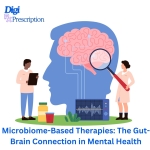Introduction
Did you know that your gut and brain are deeply connected? Scientists now believe that the microbiome—the trillions of bacteria in your gut—plays a crucial role in mental health. Research suggests that imbalances in gut bacteria may contribute to conditions like depression, anxiety, and even neurodegenerative diseases.
This discovery has led to microbiome-based therapies, a revolutionary approach to treating mental health disorders using probiotics, prebiotics, fecal microbiota transplants (FMT), and dietary interventions. In this blog, we explore how the gut-brain connection is transforming mental health treatments and what the future holds for microbiome-based therapies.
1. Understanding the Gut-Brain Connection
The gut-brain axis is a biochemical communication network between the digestive system and the brain. It works through:
???? The Vagus Nerve – The primary communication pathway between the gut and brain.
???? Gut Microbiota – Beneficial bacteria in the gut influence mood, cognition, and behavior.
???? Neurotransmitters – The gut produces 90% of serotonin (the "happiness chemical") and 50% of dopamine.
???? Inflammation & Immune Response – A dysregulated gut microbiome can trigger chronic inflammation, linked to depression and anxiety.
2. How Microbiome Imbalance Affects Mental Health
When the gut microbiome is imbalanced (dysbiosis), it can negatively impact mental health in several ways:
⚠ Increased Inflammation – Gut bacteria regulate inflammation, which is linked to depression and schizophrenia.
⚠ Reduced Neurotransmitter Production – A poor microbiome means less serotonin and dopamine, affecting mood and motivation.
⚠ Higher Cortisol Levels – Dysbiosis increases stress hormone levels, leading to anxiety and sleep disturbances.
⚠ Altered Brain Function – Studies show that gut microbiome imbalances can influence memory, cognition, and emotional regulation.
???? Key Fact: Studies have found that people with depression and anxiety often have lower levels of beneficial gut bacteria, such as Lactobacillus and Bifidobacterium.
3. Emerging Microbiome-Based Therapies for Mental Health
???? Probiotics & Prebiotics – “Psychobiotics” for Mood Improvement
- Probiotics (live beneficial bacteria) can restore gut health and improve mood.
- Prebiotics (fiber that feeds good bacteria) help beneficial microbes thrive.
- Studies show that probiotics like Lactobacillus rhamnosus and Bifidobacterium longum reduce symptoms of anxiety and depression.
???? Fecal Microbiota Transplant (FMT) – A Radical Approach
- FMT involves transferring healthy gut bacteria from a donor to a patient.
- Early trials suggest FMT reduces depression and improves cognitive function.
- A 2024 study showed that FMT helped patients with severe depression experience significant improvement within weeks.
???? Diet & Gut Health – The Food-Mood Connection
- Mediterranean & high-fiber diets promote a healthy microbiome, reducing mental health symptoms.
- Fermented foods (yogurt, kimchi, kefir) naturally support good bacteria and improve mental well-being.
???? Microbiome-Based Drugs in Development
- Pharmaceutical companies are developing microbiome-targeted drugs to treat depression, PTSD, and schizophrenia.
- Experimental therapies are exploring how gut bacteria can regulate brain inflammation and neurotransmitter production.
4. Challenges & Future of Microbiome Therapies in Mental Health
???? Standardization Issues – Everyone’s microbiome is unique, making personalized treatments necessary.
???? Regulatory Hurdles – FMT and microbiome-based drugs require more clinical trials and FDA approval.
???? Long-Term Effects Unknown – More research is needed on the long-term safety of altering the gut microbiome.
???? Future Possibilities
???? AI & Microbiome Analysis – AI will help personalize gut-based mental health treatments.
???? Precision Psychobiotics – Scientists are working on targeted probiotics for depression, anxiety, and bipolar disorder.
???? Microbiome-Based Biomarkers – Blood or stool tests may predict mental health conditions before symptoms appear.
Conclusion
The gut-brain connection is opening new doors in mental health treatment, with microbiome-based therapies showing promise in managing depression, anxiety, and more. Whether through probiotics, FMT, diet changes, or microbiome-targeted drugs, these therapies could revolutionize psychiatry by treating mental health disorders from the inside out.
While more research is needed, the future looks bright for microbiome-based mental health solutions. As science advances, we may see a day when gut health is as important as brain health in treating psychiatric conditions.
???? Would you try a microbiome-based therapy for mental health? Share your thoughts in the comments!
References:
- National Institutes of Health (NIH) – Gut Microbiome & Mental Health: www.nih.gov
- Harvard Medical School – Probiotics for Depression & Anxiety: www.health.harvard.edu
- Journal of Psychiatry Research – FMT for Depression: www.psychjournal.org
- The Gut-Brain Axis & Future Treatments – Nature Reviews Neuroscience: www.nature.com

